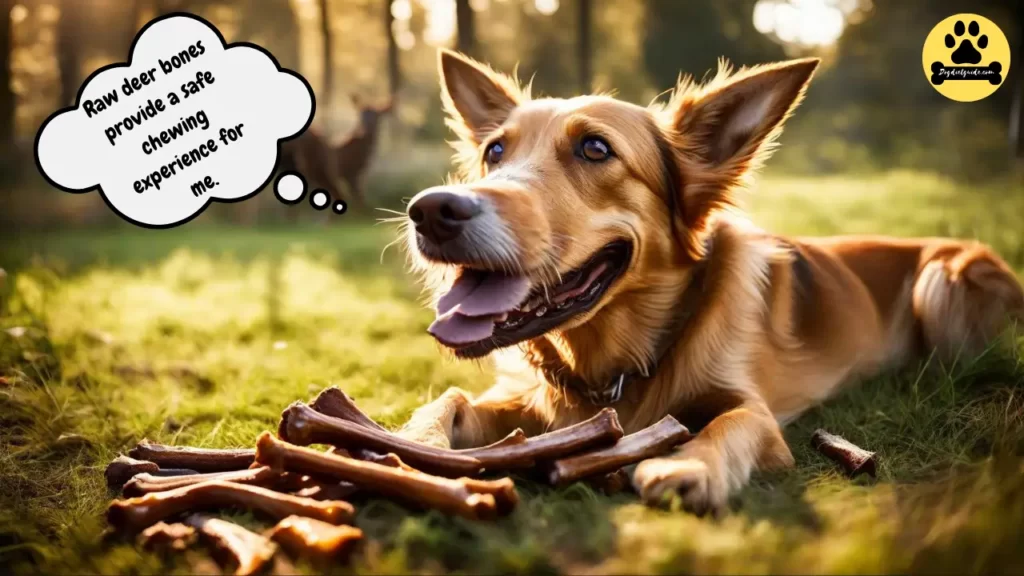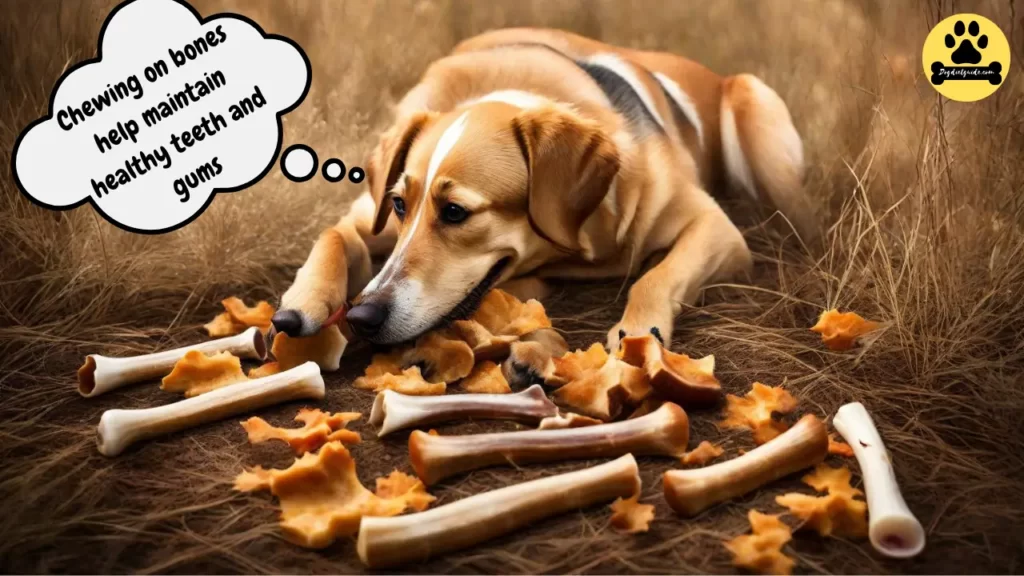Recently, there has been a growing interest in natural and raw food options for dogs, with many pet enthusiasts turning to alternatives like deer bones. The allure of these bones lies in their presumed naturalness and potential health benefits for our canine companions.
However, before introducing such treats into our pets’ diets, it is crucial to investigate whether dogs can eat deer bones. So, are deer bones safe for dogs?
Overview
Deer bones can serve as a source of essential nutrients for dogs, including calcium and phosphorus, which are crucial for bone health. However, there are inherent risks that pet owners need to be aware of. One significant concern with deer bones is the potential for splintering, posing a severe risk of injury to your dog’s mouth, throat, or digestive tract.
Understanding the Appeal of Bones for Dogs
The allure of bones as a canine delicacy date back to their ancestral roots when wild dogs relied on hunting and scavenging for sustenance.
In today’s domesticated setting, the appeal of bones for dogs persists, often seen as a natural and enjoyable treat.
Are Deer Bones Safe For Dogs?
Yes, deer bones are rich in calcium, manganese, and iron and have a high protein content, making them an excellent treat for your dog. However, it’s important to note that cooked bones are more likely to splinter than raw bones, so it is crucial to avoid giving dogs any cooked bones, including deer bones.
It’s advisable to opt for specially designed dog chews or raw bones that are appropriate for your pup’s size and do not splinter easily if you want to offer dental benefits and mental stimulation through chewing.
Always supervise your furry friend when giving them any bone or chew and consult with your veterinarian to ensure it is safe and suitable for your dog’s health needs.

Which is Safe For Dogs: Raw or Cooked Deer Bones?
Raw deer bones with meat left on them can provide a safe and beneficial chewing experience for dogs.
Many veterinarians lean towards recommending raw deer bones for dogs over cooked ones, as cooking can make bones more brittle and prone to splintering, increasing the risk of injury or obstruction.
Regardless of whether they are raw or cooked, it’s essential to consider the size of the bones, supervise your furry friend while chewing, and avoid giving them small or sharp bones that could pose a choking hazard or cause digestive issues.
Related Post: Are Deer Hooves Safe For Dogs?
Benefits of Deer Bones for Dogs
Deer bones can benefit dogs when properly prepared and given in moderation. It’s important to note that not all bones are suitable for dogs, and the bones should be given under supervision.
-
Can dogs chew on deer bones? Chewing on bones can help maintain healthy teeth and gums. The gnawing action helps remove plaque and tartar, reducing the risk of dental issues.
-
Chewing on bones provides mental stimulation for dogs. It can alleviate boredom and reduce anxiety by giving them an activity that engages their instinct to chew.
-
Bones, especially those with some meat and marrow attached, can provide additional nutrients such as calcium and phosphorus. These minerals are essential for bone and teeth health.
-
Bones containing cartilage and connective tissues may support joint health. Glucosamine and chondroitin, naturally present in these tissues, can contribute to joint flexibility and mobility.
-
Chewing bones can help promote healthy digestion. It stimulates the production of saliva and can assist in keeping the digestive system functioning correctly.

Deer Bones Risks For Dogs
-
Bones can splinter, leading to choking hazards or causing intestinal blockages if swallowed whole.
-
Consuming large amounts of bone material or sharp bone fragments can lead to digestive issues, including constipation or perforation of the digestive tract.
-
Aggressive chewers may break teeth or injure their gums while chewing hard bones.
-
Raw or improperly handled bones can carry harmful bacteria such as Salmonella or E. coli, posing a risk to canines and humans.

Safe Serving Tips
If you decide to feed deer bones to your puppy, it’s crucial to follow some guidelines:
-
Always supervise your dog when they are chewing on bones to prevent choking or other injuries.
-
Choose appropriate bones for your pet’s breed and size to minimize the risk of choking or dental issues.
-
Cooked bones can splinter easily and pose a higher risk of causing harm. Stick to raw or appropriately processed bones.
-
Bones should be given as an occasional treat rather than daily to reduce the risk of digestive issues.
Related Post: Can Dogs Eat Catnip?
How To Prepare Deer Bones For Dogs.
Obtain fresh, raw deer bones from a reliable source. Make sure they are clean and free from any signs of spoilage. Trim off any excess meat attached to the bones. While some meat is beneficial, too much can lead to an unbalanced diet.
Check the bones for sharp edges or splinters. If you find any, use a file or sandpaper to smooth out the edges to reduce the risk of injury.
Choose bones that are appropriate for your pup’s size. Larger bones are generally safer as they are less likely to be swallowed whole.
Start by introducing the bones gradually. Allow your furry friend short chewing sessions to get used to the bones.
As your dog chews, monitor the bone for small or sharp pieces that could pose a choking hazard. Remove these immediately.
If you have leftover bones, store them in the refrigerator or freezer to prevent bacterial growth. Thaw frozen bones in the fridge before giving them to your canine.
Final Thoughts: Are Deer Bones Safe For Dogs?
In conclusion, while deer bones offer nutritional benefits, their associated risks require thoughtful evaluation. Understanding the potential dangers and taking appropriate precautions can provide your canine companion with a satisfying and safe chewing experience.




![Can Dogs Eat Blood? 7 Side Effects [Expert Opinion]](https://petskor.com/wp-content/uploads/2022/04/Webp.net-resizeimage-12.jpg)
